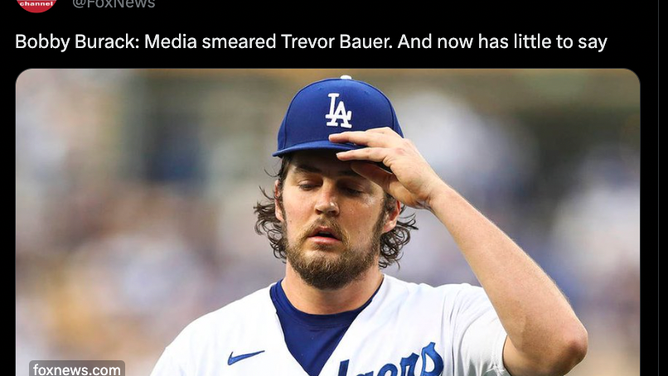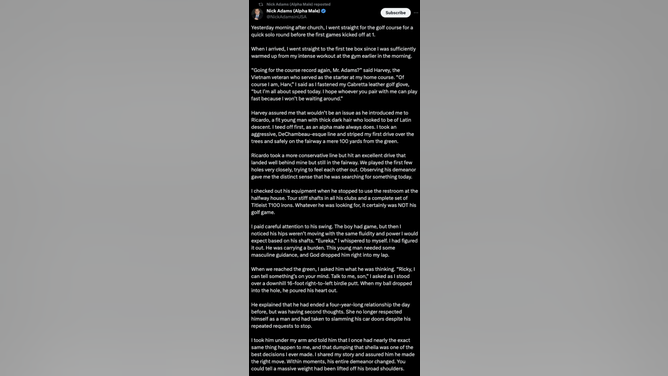Can X Become A Real Place For Journalists To Write? | Bobby Burack
As of Wednesday, X, formerly known as Twitter, no longer shows the headlines of articles.
Links attached to posts now generate a featured image along with a small text of the name of the website to which the URL directs.
Take a look:


Journalists disapprove of the update. Some journalists are again threatening to quit X over the change. They fear the update will hamper their readership.
Of course, it will. That's the point.
For decades, social media has programmed users to click on headlines to read an article. Seemingly, a user will be less inclined to click on an image.
And that's significant.
Homepage traffic is not what it was in prior years. There are readers who only read articles they see on X.
Perhaps you are one of them.
The suspicion here is that Elon Musk implemented the change to prevent users from leaving the app and to encourage journalists to publish articles directly to X.
"If you’re a journalist who wants more freedom to write and a higher income, then publish directly on this platform!" Musk wrote on X in August.
By complicating the link-sharing process, X could see an increase in direct publishing.
A user can publish up to 25,000 characters per post for $8 a month (Plus, they get a blue check.)
Surprisingly, X-exclusive columns are quite digestible. In fact, they are easier to read than most websites that bombard readers with those pesky pop-up ads.
Read a recent X column from Nick Adams, Alpha Male, below:

Way to go, Nick.
I try not to use the personal pronoun I when in print. A column should rarely be about the author penning the piece.
But I will make an exception here.
I hope X becomes a place where journalists can successfully publish content and can quit their jobs in the process.
There are so few outlets that allow journalists to be journalists -- where they can ask questions, hold people in power accountable, challenge societal norms, and offend protected classes.
(OutKick is one of the expectations.)
Most professional journalists are spineless. They have no other choice but to be spineless.
The industry often exiles those who dare to ask the wrong questions and criticize the wrong people. We saw that take place throughout the pandemic. It's still happening to this day.
Therefore, Elon Musk is correct in that X would provide journalists the "freedom" that most employers do not.
X would allow writers to bypass cowardly, compromised editors and executives who subscribed to groupthink and quash articles that dare to commit thoughtcrimes.
However, we aren't as certain Musk is correct in that journalists can receive a "higher income" by publishing directly to X.
While the platform can increase relevancy -- articles depend on X for relevancy, anyway -- there are challenges to monetizing written content on social media.
Platforms like X can generate revenue for videos by inserting pre-roll ads, which it can then share with the creator.
However, articles are not subject to the same monetization plan. It's harder to monetize written content, hence why website articles opt to include those irksome auto-play videos right in the middle of an article.
Musk advertises how journalists can monetize their writing through the ads in their mentions. He's right. Since July, qualified users have received payouts via the ad revenue generated from their mentions. Including me.
Here's the problem: the payouts are minuscule.
Too minuscule.
While X does not disclose how it calculates a payout, estimates say the service pays a user around $8.52 per one million impressions.
Even the most prolific journalist in the industry would struggle to earn a living on a $0.0085 CPM (cost per mile) basis.
So, to migrate written content fully to X, journalists would have to make their articles exclusive to Super Followers, those who pay a monthly fee for a specific user's subscription-only content.
Essentially, a writer could treat their Super Followers like paying Substack subscribers.
Before Glenn Greenwald left Substack for Locals, the Financial Times estimated that he earned around $2 million a year on the platform:
“Greenwald has between 20,000 and 40,000 paid subscribers to his newsletter, each contributing at least $5 a month,” the outlet reports. “Once Substack has taken its standard 10 percent cut, and after payment processing fees, I calculate that Greenwald is left with between $80,000 and $160,000 a month.”
The likes of Greenwald could replicate said success on X. The question is can the middle class of writers? Can the lower class? Can vultures from the Washington Post?
It's possible that X stripping the headlines for outside articles will hurt website journalists more than it empowers future journalists on its platform.
Ultimately, Elon Musk vowed to build what he calls "the everything app," which would include news, podcasts, audio, film, entertainment, and journalism.
A one-stop would be great.
But to accomplish said goal, Elon has to be able to monetize everything.